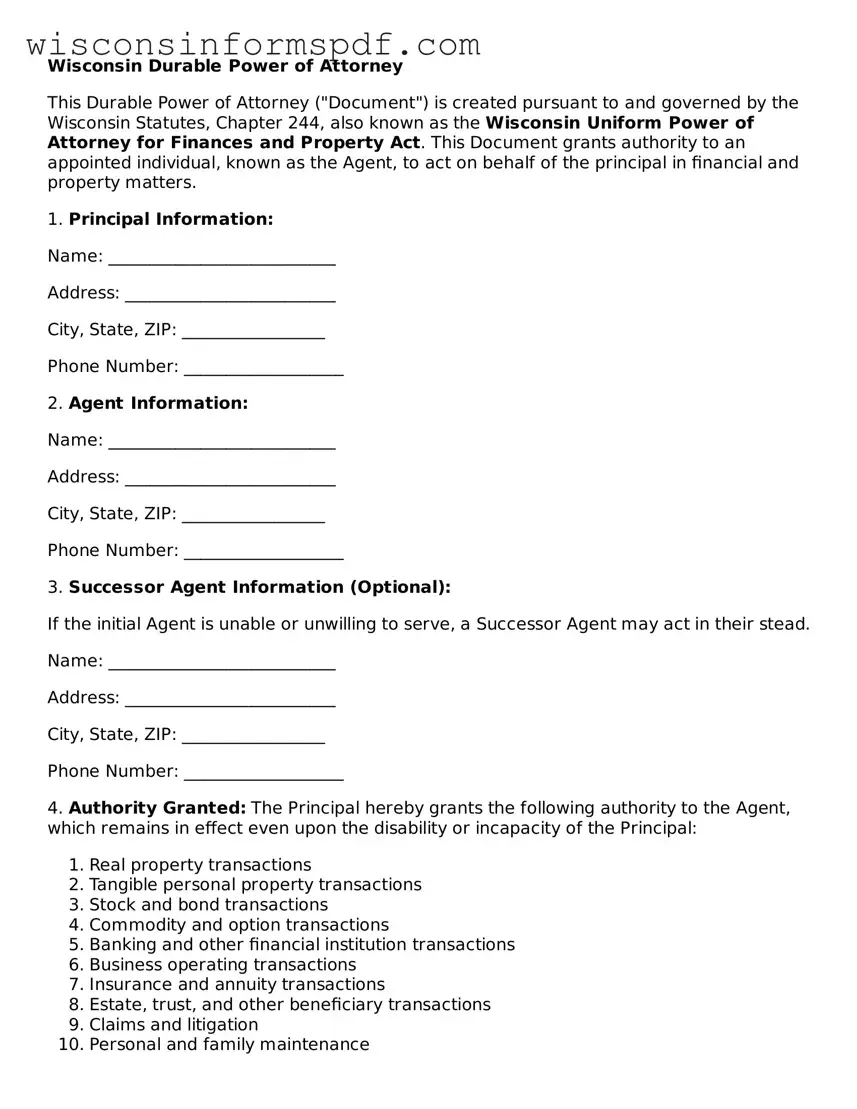Wisconsin Durable Power of Attorney
This Durable Power of Attorney ("Document") is created pursuant to and governed by the Wisconsin Statutes, Chapter 244, also known as the Wisconsin Uniform Power of Attorney for Finances and Property Act. This Document grants authority to an appointed individual, known as the Agent, to act on behalf of the principal in financial and property matters.
1. Principal Information:
Name: ___________________________
Address: _________________________
City, State, ZIP: _________________
Phone Number: ___________________
2. Agent Information:
Name: ___________________________
Address: _________________________
City, State, ZIP: _________________
Phone Number: ___________________
3. Successor Agent Information (Optional):
If the initial Agent is unable or unwilling to serve, a Successor Agent may act in their stead.
Name: ___________________________
Address: _________________________
City, State, ZIP: _________________
Phone Number: ___________________
4. Authority Granted: The Principal hereby grants the following authority to the Agent, which remains in effect even upon the disability or incapacity of the Principal:
- Real property transactions
- Tangible personal property transactions
- Stock and bond transactions
- Commodity and option transactions
- Banking and other financial institution transactions
- Business operating transactions
- Insurance and annuity transactions
- Estate, trust, and other beneficiary transactions
- Claims and litigation
- Personal and family maintenance
- Benefits from social security, Medicare, Medicaid, or other governmental programs, or military service
- Retirement plan transactions
- Tax matters
5. Special Instructions: The Principal may provide additional guidance or limit the scope of the Agent's powers in this section.
Instructions: ______________________________
__________________________________________
6. Effective Date and Duration: This Durable Power of Attorney shall become effective immediately upon execution and shall remain in effect indefinitely unless a specific termination date is herein provided by the Principal.
Effective Date: ___________________________
Termination Date (if applicable): ____________
7. Third Party Reliance: Any third party who receives a copy of this Document may act under it. Revocation of this Durable Power of Attorney is effective as to a third party only upon the third party's actual knowledge of the revocation.
8. Signature of Principal:
By signing below, the Principal acknowledges and affirms their understanding of this Document and the powers being granted to the Agent.
_________________________________________
Date: ____________________________________
9. Signature of Agent:
By signing below, the Agent accepts the designation under this Document, affirming their understanding of the responsibilities and limitations of their role, and pledges to act in the Principal's best interest in accordance with the provisions of the Wisconsin Uniform Power of Attorney for Finances and Property Act.
_________________________________________
Date: ____________________________________
10. Witness or Notarization (if required by law or preferred by the Principal): In some cases, a witness or notarization may be necessary for this Document to be considered valid by certain financial institutions or entities. If so, ensure completion of this section by a notary or qualified witness.
Notary Public/Witness Signature: _______________
Date: ____________________________________
My Commission Expires: ______________________

